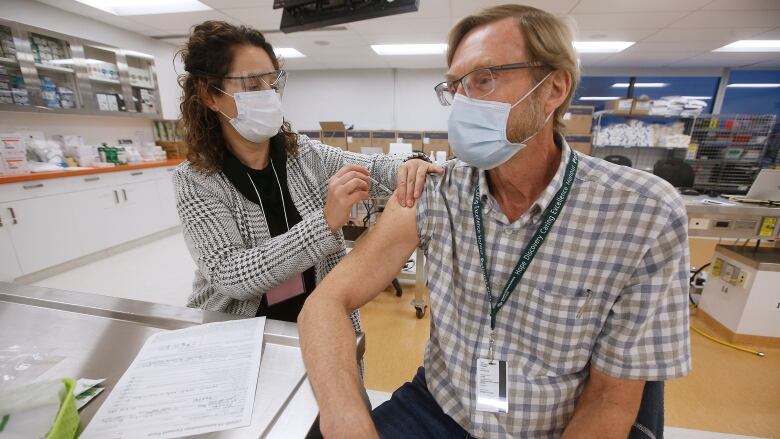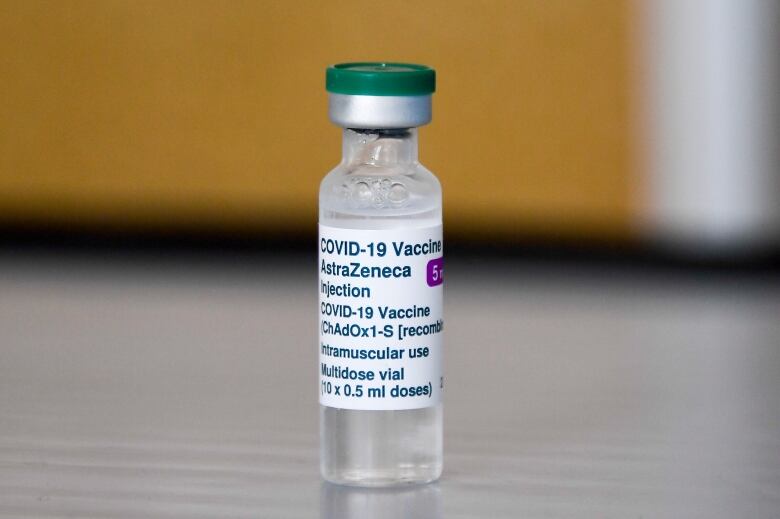Pace of immunizations, vaccine hesitancy worry majority of Manitoba doctors, survey suggests
Hesitancy rates highest in rural Manitoba, men and those 18-54, according to joint poll and doctors' survey

The majority of Manitoba doctors polled in a recent survey worry the provincial vaccine rollout is moving too slowly and that vaccine hesitancy could hamper immunizationefforts amid the growing third wave.
Eighty-eight per cent of physicians surveyed by Doctors Manitoba said they think Manitoba's immunization campaign is taking too long, meanwhile 83 per cent of Manitobanssurveyedshared similar concernsin a companion poll by Probe Research.
Men, Manitoba adultsunder the age of 55, rural Manitobans and those with less education were among those with highervaccine hesitancy or refusalrates in the Probe poll.
And about four in five Manitobans and physicians said theyare worried about the third wave.
"Physicians are concerned that not enough Manitobans are willing to get a COVID vaccine and that we may fall short in Manitoba of reaching herd immunity," said Dr. Cory Baille, president of Doctors Manitoba.
"Physicians trust and support these vaccines."
More than 1,000 doctors were surveyed between April 1 and 11, and 1,000 Manitoba adults were surveyed online by Probe from April 5 to 14. A sample of this size has a margin of error of plus or minus 3.1 percentage points, 19 times out of 20, according to Probe.
The findings were released jointly on Monday, the same day Manitoba significantly expanded eligibility criteria for the vaccinecurrently in use atpharmacies and doctors' offices. Anyone 40 and older can now get the AstraZeneca-Oxford Covishieldvaccine.
Herd immunity concerns
Over two-thirds of doctorsworry Manitoba won't hit herd immunity the proportion of a population that needs to be vaccinated in order to slow or stop the spread. Doctors Manitoba says that threshold needs to be 70 to 85 per cent.
While the Probe poll cites 74 per cent of adults as "vaccine confident," Doctors Manitoba points out the poll sampleonly represents 57 per cent of the provincial population. Those under 18 aren't currently eligible.
The latest Manitoba data shows getting even one shot offersa high degree of protection.
Epidemiologist Cynthia Carr noted late last month thatclinical trials have focused on how efficient the vaccines are atpreventing serious illness, hospitalizations and death, and not necessarily on how effective they are at reducing spread.
"At this point, from what we know about the vaccine, our focus is not necessarily herd immunity:it is prevention of the most serious outcomes for the individuals and for our health-care system," said Carr.
"Weare learning about how much reduction in transmission the vaccine may also assist with, but we don't know that yet,so we cannot say a target number of 70 or 80 per cent in terms of herd immunity."
1 in 4 hesitant: Probe
About 26 per cent of adults in the Probe poll reported being hesitant. Some don't see COVID-19 as a personal risk, others believe vaccine development was rushed and some worry about side effects.

AstraZenecarollout has hit delays around the world after a small fraction of those to receive it experienced rare but serious blood clots.
So far, 20 million doses have been administered worldwide; risk of a clot is somewhere around 1 in 250,000.By contrast, therisk of a clot fromCOVID-19 is eight to 10 times higher than from a vaccine, according to an Oxford study.
Health Canada said last week the vaccineis safe and urged Canadians not to hesitate, as risks associated with COVID-19 outweigh those of the vaccine.
Ontario, Alberta and Manitoba all recently dropped eligibility requirements for AstraZenecato expedite immunizations.The poll was conduced before those announcements.
Doctors support expanding AstraZeneca eligibility, though we believe doses should be prioritized first to those most at risk from COVID-19.
The biggest limitation right now is vaccine supply. Only 27 doctor's offices have vaccine appointments out of about 180 participating.
—@DoctorsManitobaMen more hesitant
According to Probe, nineper cent of Manitobansare unlikely to get vaccinated at all versus 16 per cent who are hesitant.
Men (12 per cent) and people living outside of Winnipeg (13 per cent) are twice as unlikely as women (six per cent) or those living within Winnipeg (six per cent)to get vaccinated.
Ninety-six per cent of university graduates polled plan to get it, but only about 80 per cent with a high school education or less say they will.
Manitobans age 18-34 and 35-54 shared similar rates.About one in five in each category say they're hesitant, and roughly one in 10 saythey're unlikely to get vaccinated at all.
Expediting vaccination campaign
Doctors Manitoba says with the right support, physicians can help combatvaccine hesitancy.
Ninety-five per cent of doctors in the province have received at least one dose so far, illustrating a high degree of confidence in vaccines.
Doctors' offices are also thepreferred site of getting the jab.
The Probe poll suggests 88 per cent of Manitobans would prefer to get immunized by their doctor over other options. And 44per cent of those who are hesitant would be more likely to get it if they could access the vaccine through their doctor.
But the poll also shows 56 per cent of Manitobans have a hard time figuring out when they'll become eligible.Baille said Doctors Manitoba'svaccine information websiteis meant to address that gap, in addition to theprovincial website.
Currently, AstraZeneca is being doled out by doctors' offices and pharmacies. But Baille says doctors would also like to be able to administer theModerna and Pfizer-BioNTech vaccines.
"Vaccine supply is really the limiting factor," Baille toldInformation Radiohost Marcy Markusa on Monday.
"I think we're at a cusp in Manitoba where hopefully we can get ahead of this with quick vaccination, but we know what can happen if we do not."
With files from Peggy Lam












_(720p).jpg)


 OFFICIAL HD MUSIC VIDEO.jpg)
.jpg)



























































































